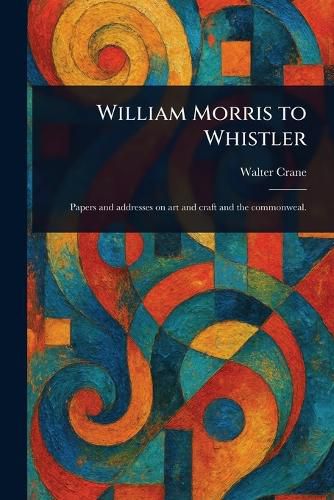Readings Newsletter
Become a Readings Member to make your shopping experience even easier.
Sign in or sign up for free!
You’re not far away from qualifying for FREE standard shipping within Australia
You’ve qualified for FREE standard shipping within Australia
The cart is loading…






This title is printed to order. This book may have been self-published. If so, we cannot guarantee the quality of the content. In the main most books will have gone through the editing process however some may not. We therefore suggest that you be aware of this before ordering this book. If in doubt check either the author or publisher’s details as we are unable to accept any returns unless they are faulty. Please contact us if you have any questions.
Explore the heart of the Arts and Crafts movement in "William Morris to Whistler: Papers and addresses on art and craft and the commonweal," a collection of insightful writings by Walter Crane. This volume delves into the core tenets of the movement, offering a fascinating glimpse into the artistic philosophies of late 19th-century Britain.
Crane, a prominent figure alongside William Morris, examines the vital connection between art, craft, and society. He presents thought-provoking perspectives on aesthetics and the role of art criticism, addressing a range of topics relevant to the artistic landscape of his time.
From discussions on interior design to broader considerations of art history, this book provides a valuable historical perspective. It illuminates the debates and innovations that shaped the Arts and Crafts movement and influenced generations of artists and designers. A key resource for understanding this pivotal period in art history.
This work has been selected by scholars as being culturally important, and is part of the knowledge base of civilization as we know it.
This work is in the public domain in the United States of America, and possibly other nations. Within the United States, you may freely copy and distribute this work, as no entity (individual or corporate) has a copyright on the body of the work.
Scholars believe, and we concur, that this work is important enough to be preserved, reproduced, and made generally available to the public. We appreciate your support of the preservation process, and thank you for being an important part of keeping this knowledge alive and relevant.
$9.00 standard shipping within Australia
FREE standard shipping within Australia for orders over $100.00
Express & International shipping calculated at checkout
Stock availability can be subject to change without notice. We recommend calling the shop or contacting our online team to check availability of low stock items. Please see our Shopping Online page for more details.
This title is printed to order. This book may have been self-published. If so, we cannot guarantee the quality of the content. In the main most books will have gone through the editing process however some may not. We therefore suggest that you be aware of this before ordering this book. If in doubt check either the author or publisher’s details as we are unable to accept any returns unless they are faulty. Please contact us if you have any questions.
Explore the heart of the Arts and Crafts movement in "William Morris to Whistler: Papers and addresses on art and craft and the commonweal," a collection of insightful writings by Walter Crane. This volume delves into the core tenets of the movement, offering a fascinating glimpse into the artistic philosophies of late 19th-century Britain.
Crane, a prominent figure alongside William Morris, examines the vital connection between art, craft, and society. He presents thought-provoking perspectives on aesthetics and the role of art criticism, addressing a range of topics relevant to the artistic landscape of his time.
From discussions on interior design to broader considerations of art history, this book provides a valuable historical perspective. It illuminates the debates and innovations that shaped the Arts and Crafts movement and influenced generations of artists and designers. A key resource for understanding this pivotal period in art history.
This work has been selected by scholars as being culturally important, and is part of the knowledge base of civilization as we know it.
This work is in the public domain in the United States of America, and possibly other nations. Within the United States, you may freely copy and distribute this work, as no entity (individual or corporate) has a copyright on the body of the work.
Scholars believe, and we concur, that this work is important enough to be preserved, reproduced, and made generally available to the public. We appreciate your support of the preservation process, and thank you for being an important part of keeping this knowledge alive and relevant.